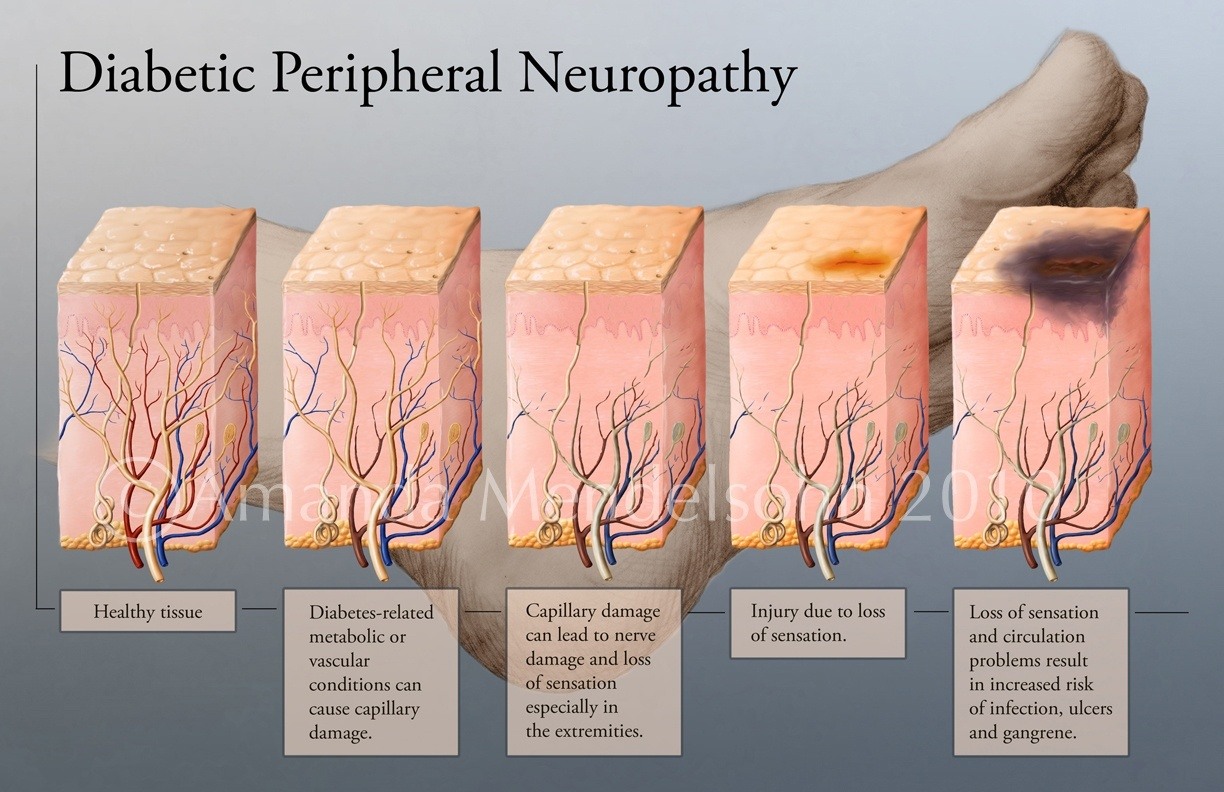Diabetic neuropathy is actually nerve damage that is caused by diabetes. In case a person has had diabetes for an extended period of time, mainly if they had difficulties controlling their diabetes, they might get neuropathy symptoms such as numbness, tingling, and burning.
As a matter of fact, according to estimations, more than 70 percent of those who have diabetes will probably have this issue. Often, diabetic nerve damage happens when the nerves are exposed to inflammation, high blood glucose, and decreased supply of blood.
Diabetic neuropathy has four different types. Read on, to find out more.
4 Types of Diabetic Neuropathy
1. Peripheral Neuropathy
This is the most common type of neuropathy which affects those with diabetes. Usually, the symptoms start in the legs and feet; then they move to the arms and hands. So, the symptoms are:
- Loss of coordination and balance,
- Numbness,
- Loss of temperature sensation or pain,
- Burning or tingling,
- Acute sensitivity to touch,
- Cramps or sharp pain,
- Joint and bone pain,
- Severe foot injury, including deformities, ulcerations, and infections,
- Loss of reflexes, starting with the ankles,
- Muscle weakness.
2. Radiculoplexus Neuropathy
This type of neuropathy is known by the name radiculoplexus neuropathy, proximal neuropathy, diabetic amyotrophy, and femoral neuropathy.
As a matter of fact, this type impacts the nerves in the legs, thighs, buttocks, and hips. Usually, the symptoms are felt only on one side of the body, and they might improve with time. So, the symptoms are:
- Weight loss,
- Acute pain in the buttock, hip, or thigh,
- Abdominal swelling in case the nerves are involved,
- Atrophied muscles with associated disability and weakness.
3. Mononeuropathy
Mononeuropathy is also known by the name focal neuropathy. As a matter of fact, it actually damages only one nerve. This nerve might be found anywhere on the leg, face, or torso.
It usually happens suddenly, and mostly it occurs in older adults. Although it’s painful, the good news is that the pain is temporary and it lasts a few months or weeks. Therefore, the symptoms are specific to the nerve which is affected, and they might include:
- Pain in the abdomen or chest
- Bell’s Palsy, paralysis on only one side of the face
- Pain in the foot or shin
- Double vision, pain in one eye, or difficulty focusing
- Pain in the pelvis or lower back
- Pain in the thigh, i.e., in the front
4. Autonomic Neuropathy
The autonomic nerves control the breathing, beating of the heart, movement of the stomach contents, bladder control, and movement of the waste in the intestines. Moreover, these nerves act without the control of conscious thought. So, the symptoms are:
- Difficulty swallowing,
- Hypoglycemic unawareness (inability to notice that the blood sugar is too low),
- Decreased or increased sweating,
- Bladder issues (incontinence, retention, or infections),
- Uncontrollable diarrhea,
- Constipation,
- Issues with the regulation of the body temperature,
- Gastroparesis (slow emptying of the stomach),
- Increased rate of the heart when at rest,
- Change in the way they adjust when changing from dark to light and vice versa,
- Loss of ability to adjust heart rate and blood pressure.
Conclusion
Around 70 percent of those with diabetes have a certain degree of neuropathy; even, in this case, these people are asymptomatic.
The longer someone has the diagnosis, the higher the likelihood of developing neuropathy. Other risk factors are high blood pressure, smoking, increased blood lipids, and obesity.
Furthermore, those who have diabetes should check their fingers, hands, and feet on a regular basis. In fact, they should watch out for particular damage or change.
Neuropathy causes no or slow healing in these areas, which means that even a minor injury might lead to amputation in case the damage is not seen on time.

